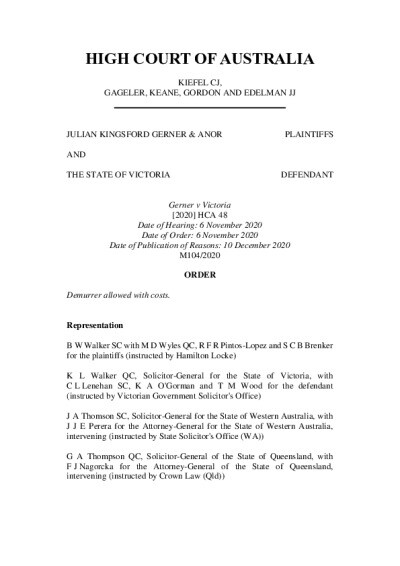
Date
Geographical Area
Pacific
Countries
Australia
Keywords
Case Name
Gerner & Anor v The State of Victoria
Case Reference
[2020] HCA 48
Name of Court
High Court of Australia
Key Facts
In response to the rising number of Covid-19 cases within Australia and internationally on 16 March 2020, the Minister of Health declared a state of emergency for the State of Victoria. As per the Public Health and Wellbeing Act 2008 (Vic), when a state of emergency is imposed, the Chief Health Officer can exercise emergency powers, including, under s.200(1)(b) and (d), the ability to restrict the movement of any persons or group of persons within the emergency area and to give any direction that the authorised officer considers to be reasonably necessary to protect public health. Since 16 March 2020, directions restricting the movement of people within Victoria through lockdowns have been made multiple times.
The plaintiffs in this case, a restaurant owner and his restaurant in Melbourne, claimed that s.200(1)(b) and (d) as well as the lockdown declarations made under them, were invalid as they were an infringement on the guarantee of the freedom of movement which was implied in the Constitution. The defendants disagreed with the plaintiff’s claim, arguing that the Constitution does not imply a freedom of movement.
The plaintiffs in this case, a restaurant owner and his restaurant in Melbourne, claimed that s.200(1)(b) and (d) as well as the lockdown declarations made under them, were invalid as they were an infringement on the guarantee of the freedom of movement which was implied in the Constitution. The defendants disagreed with the plaintiff’s claim, arguing that the Constitution does not imply a freedom of movement.
Decision and Reasoning
Citing Blackstone’s Commentaries on the Laws of England, the Court noted that the personal liberties of a person does include locomotion; however, this could be regulated by the due course of law. Therefore, to accept that the Constitution did imply a freedom of movement would be to assert that the Constitution denies the Commonwealth and its States the power to make laws which restrict a person’s freedom of movement. The Court did not believe such a restriction on the State’s power existed, stating that the proposition that a State’s legislative powers – which are protected by s.106 of the Constitution – could be necessarily limited by the freedom of movement was not supported by the text or structure of the Constitution. Therefore, the Court found that there is no implied freedom of movement.
The plaintiffs also raised the argument that the freedom of movement was necessary for the maintenance of the constitutional system of representative and responsible government as an aspect of the implied freedom of political communication. The limitations on legislative power created by the implied freedom of political communication has been recognised by the Courts as a necessary implication of the express provisions in the Constitution; however, as the Court stated, limits on communication or movement which do not have political character do not fall foul of this constitutional protection. Therefore, as the plaintiff did not plead that the Act or lockdown directions restricted political communication, there had been no breach.
Nor did the Court find that a freedom of movement was implied in s.92 of the Constitution – this section protects interstate trade, commerce, and intercourse. This is because such a finding would be in contradiction of previous cases, the section was drafted so to protect the free flow of goods across State borders in the newly formed federation, and a 1897 discussion stated that what was to become s.92 did not remove police powers to prevent contagious diseases from entering the territory.
The plaintiffs also raised the argument that the freedom of movement was necessary for the maintenance of the constitutional system of representative and responsible government as an aspect of the implied freedom of political communication. The limitations on legislative power created by the implied freedom of political communication has been recognised by the Courts as a necessary implication of the express provisions in the Constitution; however, as the Court stated, limits on communication or movement which do not have political character do not fall foul of this constitutional protection. Therefore, as the plaintiff did not plead that the Act or lockdown directions restricted political communication, there had been no breach.
Nor did the Court find that a freedom of movement was implied in s.92 of the Constitution – this section protects interstate trade, commerce, and intercourse. This is because such a finding would be in contradiction of previous cases, the section was drafted so to protect the free flow of goods across State borders in the newly formed federation, and a 1897 discussion stated that what was to become s.92 did not remove police powers to prevent contagious diseases from entering the territory.
Outcome
The plaintiff’s claim that the Constitution includes an implied freedom of movement was rejected.
Link
Disclaimer
This case law summary was developed as part of the Disaster Law Database (DISLAW) project, and is not an official record of the case.
Document
Document